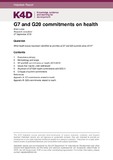| dc.description.abstract | There are four health issues that have received the most consistent attention in G7 and G20 summit declarations, having been addressed in more than half of the summits since 2015 and appearing in 30 or more commitments over that time. Those issues are health systems strengthening, infectious diseases (including HIV/AIDS, tuberculosis, malaria, polio, neglected tropical diseases, and vaccination), antimicrobial resistance (AMR) and public health crises. Other issues highlighted in at least half of the summits include the importance of the One Health approach and multisectoral working (particularly in the context of combating antimicrobial resistance), research and development (in the context of work on infectious diseases and antimicrobial resistance), and universal health coverage. G7 and G20 summit declarations have tended to neglect non-communicable diseases, environmental pollution, tobacco control, substance abuse, road traffic morbidity and mortality, access to essential medicines via the Agreement on Trade-Related Aspects of Intellectual Property Rights (TRIPS), and social issues such as equity and the social determinants of health (Kirton & Bracht, 2015; McBride et al., 2019). G7 health commitments are closely aligned with Sustainable Development Goal 3, with commitments corresponding to 24 out of the 28 targets and principles in SDG 3. The G20’s commitments on health are less well aligned to SDG 3, matching only 14 of the 28 targets and principles (McBride et al., 2019). Some authors have criticised G7 and G20 health commitments for not being specific or measurable enough to hold member states to account effectively (Kirton & Bracht, 2015; Horton, 2017; McBride et al., 2019). The G7 and G20 both refer to inclusiveness in the form of supporting work towards universal health coverage, although this is more prevalent for the G7 than for the G20. The G7 included specific references to women’s and girls’ health among their commitments, while no specific references to gender were noted in G20 health-related commitments. No specific references to disability were observed in the summit documents reviewed for this report. | en |

